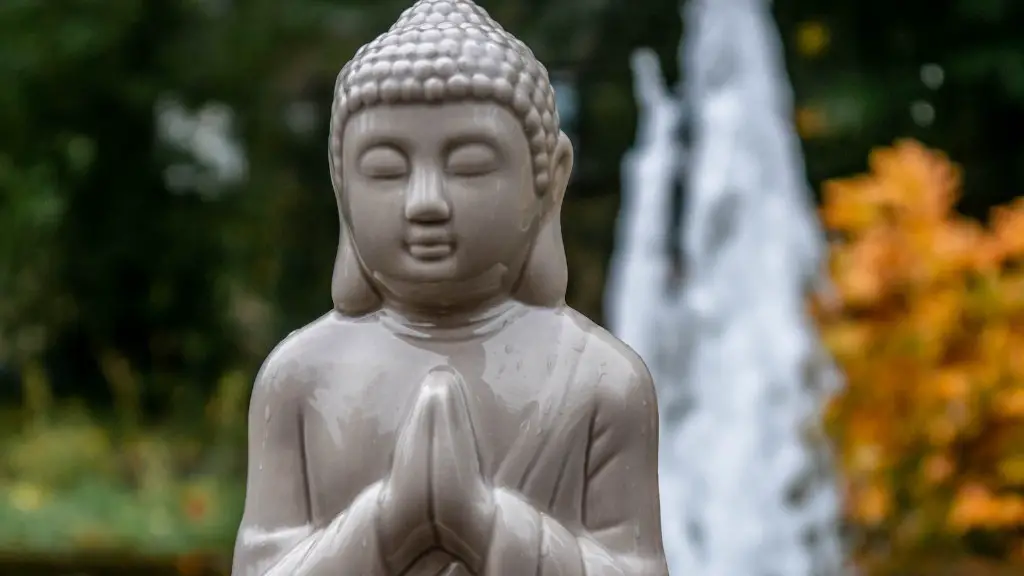When followers of Hinduism want to get closer to God, the meaning and importance of the word atman begins to take shape. A critical aspect of Hinduism is understanding atman as the true, inner self, as well as its relationship with Brahman, the ultimate reality of all things. As Hindu philosophy describes it, the atman and Brahman form a greater unity, and worshippers can deepen the connection between themselves and Brahman by exploring the atman within themselves. By doing so, those who are new to Hinduism may get closer to God and achieve spiritual enlightenment through its practices.
Drawing inspiration from Hindu scriptures, one of the key ways to get closer to God according to Hinduism is by developing personal discipline and purifying one’s self. Self-control and focus are essential elements of Hindu practice and being able to focus one’s mind and concentrate on spiritual matters will help a person refine their spiritual awareness and ability to connect with God. Self-discipline can be developed by attending spiritual classes in local temples, engaging in regular prayer and meditation, and maintaining an ascetic lifestyle. Additionally, engaging in charitable activities is also an important part of Hinduism and serves to cultivate one’s spiritual awareness.
The practice of self-inquiry is another important way to get closer to God. Through self-inquiry, adherents of Hinduism can come to understand the underlying truths of life in greater depth, and ultimately realise the oneness of the atman with Brahman. Self-inquiry involves exploring the nature of one’s thoughts and feelings, and deepening the connection between the mind, body, and spirit. With daily practice, adherents of Hinduism can move closer to spiritual enlightenment, enabling them to develop and nurture a deeper spiritual connection with God.
Finally, living with love and compassion towards all living beings is another key component of getting closer to God in Hinduism. Hinduism places great emphasis on the notion of karma, the law of cause and effect, which states that all of one’s actions and decisions will manifest in the form of good or bad consequences. Adherents of Hinduism understand that cultivating love and compassion in all of one’s dealings and decisions is the surest path towards spiritual enlightenment and a deeper connection with God. The practice of ahimsa—non-harming in one’s thoughts and behaviours—is paramount to Hinduism and will open one’s heart and soul to receive the blessings of the divine.
Developing Personal Practice
The development of a personal practice of Hinduism is essential for adherents looking to get closer to God. While drawing inspiration from the teachings of Hindu scriptures and the wisdom of local religious leaders is beneficial for understanding Hindu doctrine, ultimately each individual must find a personal practice that works best for them. For example, instead of relying solely on scriptures and religious leaders, one should strive to find their own understanding and interpretation of the teachings and doctrines of Hinduism. By developing a personal practice of yoga, meditation, and prayer, individuals can become closer to God and cultivate a deeper spiritual awareness.
To begin, one should take time to reflect and meditate on their own thoughts and feelings. Over time, they should come to understand the core principles of Hinduism, such as the laws of karma, the cycle of death and rebirth, ahimsa, and the connection between the atman and Brahman, as well as its application in their life. Through this process, the individual can understand and accept Hinduism as an integral part of their life and come to discover their own spiritual path towards God. This can be achieved by reading scriptures, engaging with other adherents, and developing a personal practice of yoga and meditation.
It is also important for individuals to maintain a healthy lifestyle as an integral part of their personal practice of Hinduism. Eating a balanced diet, getting enough sleep, and exercising on a regular basis can help one stay energised and maintain a healthy body and mind. Additionally, it is important to practice gratitude and humility, and be generous with others. This will cultivate an open mind and heart, allowing one to become closer to God.
Finally, it is essential to maintain a sense of acceptance and trust in the divine. Instead of striving for perfection and rigidity in one’s practice, the individual should instead remain open to the unknown and trust that the divine will lead them to their ultimate destination. It is important to remember that the path to spiritual enlightenment is unique to each person, and the divine will guide each person in their journey.
Connecting with Others
Connecting with others who are also on a spiritual journey can be a great way to get closer to God in Hinduism. Connecting with other adherents provides a safe, supportive environment in which to make authentic connections, express one’s thoughts and feelings, and explore spiritual topics in depth. By connecting with others, adherents can share knowledge, wisdom, and insights, gain a greater understanding of Hinduism, and cultivate a deeper connection with God.
In addition, it is important to engage in bhajan and kirtan, which are both forms of devotional singing and chanting. Singing is an effective way to cultivate a sense of spiritual connection, as well as to express emotions in a meaningful way. Listening to devotional music can also be a great way to clear the mind and tap into a higher spiritual awareness. Additionally, engaging in chanting and singing mantras is also a powerful way to get closer to God.
It is also important to take advantage of opportunities to serve those in need. Service to the divine can take many forms, such as volunteering in one’s local temple, providing financial support to those who are less fortunate, or participating in charitable activities. By engaging in service, one can cultivate a spirit of humility and compassion, enabling them to become closer to God.
Finally, connecting with a guru or spiritual teacher can be a great way to get closer to God. By following a guru, an individual can learn and practice Hinduism in a more systematic, structured way. Following a guru will provide the individual with the tools and support they need to achieve spiritual growth and come closer to the divine.
Engaging in Devotional Rituals
Engaging in devotional rituals is another way to get closer to God in Hinduism. From daily prayers and puja rituals to visiting temples and attending festivals, there are many outlets for expressing one’s devotion and gratitude to the divine. Devotional rituals provide a platform for the individual to connect with God in a tangible and meaningful way, and offer the opportunity to cultivate a deeper level of understanding of Hinduism.
Prayer is one of the most important devotional rituals one can engage in. Praying to the divine on a regular basis is essential to Hinduism, as it helps to cultivate a spiritual connection and ensures that the individual is in tune with the divine. Engaging in puja rituals, in which offerings are made to the gods and goddesses to show one’s devotion and gratitude, is another important ritual. Additionally, taking part in festivals and celebrations is a great opportunity to come together with other Hindus, express one’s faith and devotion, and get closer to the divine.
Visiting temples and sacred sites is also a key part of getting closer to God in Hinduism. Temples provide adherents with a place to come together in a communal setting, as well as a platform from which to deepen one’s understanding of Hinduism and explore spiritual topics in greater depth. Additionally, temples often provide a safe and welcoming space for individuals to express their emotions and feelings, enabling them to connect with the divine in a more tangible and meaningful way.
Finally, engaging in hatha yoga is another important devotional ritual in Hinduism. Hatha yoga is an ancient meditation and yoga practice developed to cultivate a deeper understanding of the divine, as well as to gain spiritual enlightenment. The practice of hatha yoga helps to bring the body, mind, and soul into a balanced, harmonious state, allowing the individual to become closer to God and achieve spiritual growth.
Adopting a Mindful Lifestyle
Finally, living a mindful lifestyle is an essential element of Hinduism. Mindfulness enables one to remain present, aware, and attentive, allowing them to cultivate a sense of calmness and clarity. Through mindful living, one is able to gain a greater understanding of their thoughts and feelings, as well as a better connection to their inner self and the divine. Maintaining a consistent mindfulness practice, such as engaging in regular meditation and prayer, will enable adherents to become closer to God and move closer to spiritual enlightenment.
It is also important to maintain a sense of gratitude in every aspect of life. Practicing gratitude will open the individual’s heart and mind to receive the blessings of the divine. Additionally, it is important to be kind and generous towards others, as well as forgive one’s own mistakes. By engaging in these practices, adherents can begin to cultivate a sense of humility and compassion, as well as a deeper connection to the divine.
Maintaining a regular spiritual practice is also key for adherents looking to get closer to God in Hinduism. Reading and reflecting on scriptures, engaging in prayer and meditation, and visiting temples, sacred sites, and holy places will all help foster spiritual awareness, enabling them to become closer to God. Additionally, engaging in service to the divine and to others will allow the individual to express their devotion and gratitude in a tangible, meaningful way.
Finally, connecting with like-minded individuals who are on a similar spiritual path can be a great way to learn and grow in one’s faith. Connecting with others provides an opportunity to discuss spiritual topics in depth, as well as to exchange knowledge and wisdom. By connecting with others, adherents can cultivate a deeper connection to God and move closer to spiritual enlightenment.

